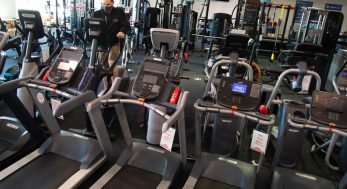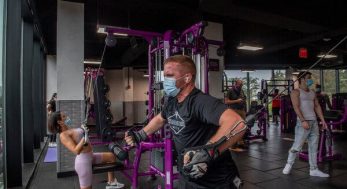Fitness businesses across Buffalo Niagara, shuttered by Covid-19 for nearly three months, inch closer to reopening.
Big-box gyms, wellness centers and boutique studios alike await word from New York State about whether they can resume operations next Tuesday, when the region enters phase three of emergence from its pause, or if they need to wait until phase four, which may not start until July.
“We’re trying to gear ourselves up to be prepared for whenever they say we can open,” said Patty Simonson, associate executive director of the Jewish Community Center of Greater Buffalo.
The state Department of Health this week had not yet provided reopening guidelines for fitness ventures. Related businesses, aware that Gov. Andrew Cuomo caught religious leaders off-guard last weekend by announcing houses of worship could partially reopen immediately, want to avoid the same flat-footed feeling.
This is what to expect whenever fitness facilities reopen.
Fewer people, more space

When the cardio fitness areas reopen in the at the JCC, some equipment will blocked off with cones to keep members a safe distance apart. The number of members in the area will also be limited and staff will sanitize each piece of equipment after every use. (Derek Gee/Buffalo News)
The new normal for other indoor gathering experiences will hold true in fitness because the goal remains the same – limit the spread of Covid-19.
Disinfecting, physical distancing and mask-wearing will color the atmosphere.
“We pretty much have all of our equipment sanitized, cleaned and marked off,” Simonson said. “We, too are going to phase within our facilities.”
The JCC continued to pay its staff during the pause, including instructors who will continue to provide a robust schedule of free online classes available to all at jccbuffalo.org.
Those classes eventually will come at a modest cost.
“The free stuff, while we’re happy to do it as a service during this crisis, we’re a not-for-profit, mission-based organization,” Executive Director Rick Zakalik said. “No money, no mission.”
The JCC will unveil a host of changes when it reopens its Holland Family Building in Buffalo and Benderson Family Building in Getzville.
Zakalik and Simonson compared notes with JCCs across the country, including those already reopened. They and other fitness outfits also looked for guidance from county, state and federal health agencies.
Those who want to participate in JCC cardiovascular, strength and group fitness training will need to reserve time using an app called upace, to assure that both locations live within expected limited occupancy guidelines. The JCC has more than 10,000 members.
All staff, members and visitors will have to answer several questions when they arrive:
- Have you been in close contact with someone who has had a confirmed case of Covid-19 within the last 14 days?
- Are you experiencing a cough, shortness of breath, sore throat or fever in the last 48 hours?
- Have you had any new loss of taste or smell?
- Have you experienced vomiting or diarrhea in the last 24 hours?
If they answer yes to any of those questions, and if a temperature reading is 100.4 or higher, they will be sent away.
Bent on safety
Group fitness classes – most of which once served up to 40 participants – likely will start with a limit of 10 members separated in all directions by at least 10 feet, Simonson said.
Cardio and strength-training equipment has been spread out and staff will sanitize equipment after it is used. More sanitizing stations have been added.
Locker rooms will remain closed to start and will open two weeks before showers. Members who use indoor and outdoor pools will have to wait a few weeks. At first, the indoor pools will be reserved for lap swimming.
“It’s going to be a learning process,” Simonson said. “We’re going to be very nimble.”
Face coverings will be a tricky part. Everyone who enters the JCC will need to wear one while they’re walking around. Staff, including trainers, will wear them, though the JCC and others believe members exerting themselves in classes and on exercise equipment should be exempt.
“Anybody who chooses to keep one on is certainly welcome to do so,” Simonson said, “but we’re also conscious about what it’s like to wear a mask when you’re working out. That’s tough.”
YMCA Buffalo Niagara expects to roll out similar plans at its seven branches in Erie and Niagara counties, said Pam Vetrano, senior program director of the Wellness Center at the Independent Health Family Branch YMCA. Silver Sneakers programs for older members will be delayed.
LA Fitness and big-box gyms with sites in other states already have posted similar guidelines online.
Size matters

Don Heins enjoys an amazing view of Canalside from Impact Sports Performance before the facility at LECOM Harborcenter closed for a pause in March due to Covid-19. (Robert Kirkham/News file photo)
Fitness centers with hundreds of members who can walk in anytime will have a greater challenge, predicted Brian DeLuca, director of physical therapy and impact sports performance at UBMD Orthopaedics & Sports Medicine, which serves professional, college and high school athletes, and helps people of all ages recover from joint and musculoskeletal injuries.
“It’s going to be an easier transition for us because we can control the volume. Everything is scheduled,” said DeLuca, a physical therapist and certified strength coach with an MBA from the University at Buffalo.
Physical therapists and trainers at UBMD Ortho Physical Therapy and Performance Training Center continued to bring those recovering from injury or needed surgery during the shutdown into the Orchard Park office, DeLuca said. Reacting to the pandemic has forced staff to work staggered schedules, shorten appointments and ask patients to do more exercises at home to assure physical distancing and Covid-19 prevention.
The practice also owns Impact Sports Performance downtown in LECOM Harborcenter, which closed with other fitness operations in mid-March. Its strength and conditioning trainers have charged clients reduced fees for virtual visits and created a reopening plan they soon hope to set in motion.
“Regardless of what happens with the reopening over the next six, nine months, virtual training is going to be an important piece,” DeLuca said. “Maybe you’re only going to train someone once or twice in person versus them normally coming in three or four times.”
Clientele matters, too

Derek Alessi, owner of Dr. Derek Health and Fitness in Clarence, said he has gone the extra mile to prepare for an opening he expects to make next week. (Mark Mulville/News file photo)
Dr. Derek Health and Fitness in Clarence also will enjoy greater control of the scheduled services it provides. Its challenge: give safe haven to clients who range in age from 40 to 70.
Those clients are active and well educated, with means to pay for personal fitness and nutrition training, owner Derek Alessi said, but two-thirds of them have medical conditions that include high blood pressure, high blood sugar, arthritis, asthma and autoimmune conditions.
Those conditions can shorten the lifespan by a decade or more.
“That was always my pitch … ” Alessi said, “but now, on top of that, if you have underlying conditions, you might not make it to the end of this year.”
Alessi laid off 11 employees, who are collecting unemployment, and stopped billing clients when Cuomo directed health and wellness businesses to close.
He since has reached out daily online to all 150 of those clients, sharing self-made exercise videos, healthy recipes and cooking advice.
Alessi learned his business qualifies for phase three under a personal services code that includes nonmedical diet and weight loss centers, physical therapy and physical fitness consultants.
He plans next week to start bringing clients back to a wellness center fortified against the novel coronavirus. A deep cleaning company and ultraviolet light was used to sterilize the wellness center and its fitness equipment. The staff will wear gloves and KN95 face masks – the latter of which they also will provide to clients when asked.
First one-on-one visits will involve an update on medical history, body composition, blood pressure and blood oxygenation levels.
A hybrid model

Signs at a hand sanitizer station urge members at the the JCC Benderson Family Building in Getzville to sanitize before and after using the health facilities there. (Derek Gee/Buffalo News)
DeLuca, Alessi and others know that some clients and gym members – particularly those who are older and have compromised immunity – may feel uncomfortable for months, maybe longer, returning to a gym or fitness studio.
Their biggest concern is that they will continue to see what the pandemic already has wrought on exercise, diet and sleep habits – three pillars that help build strength, immunity and physical and mental well-being.
Alessi said about 15% of his clients regularly checked in with him, kept those pillars steady during the last three months, and stayed well. About 40% took some steps but could have done so more consistently and gained a few pounds. Another 20% got bogged down with anxiety or depression, didn’t check in quite as often, and gained up to 15 pounds.
“The last group is the 25% that I haven’t heard from,” Alessi said.
DeLuca encouraged those who can’t afford the new hybrid fitness model to find free apps and classes online or put more walking and other activity into a regular routine.
“Illness is going to happen so you want to prepare your body for it and people don’t think about exercise as a tool,” he said. “When you have a respiratory illness and you’re compromised with swelling, inflammation and you’re deprived of oxygen, fitness training can really help prepare you to get through that.”
Two popular outdoor group fitness programs start virtually – for now
email: refresh@buffnews.com
Twitter: @BNrefresh, @ScottBScanlon

